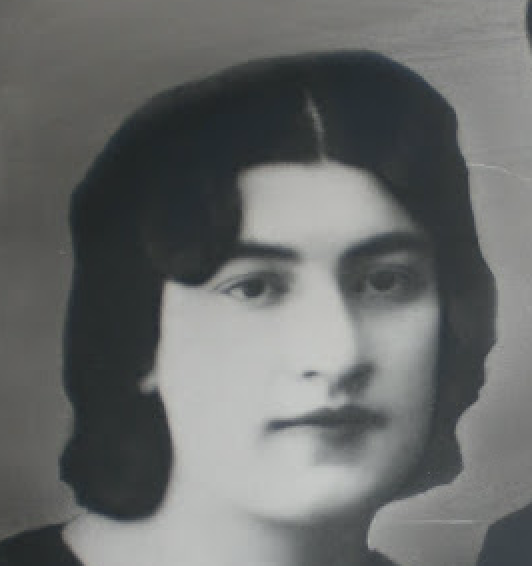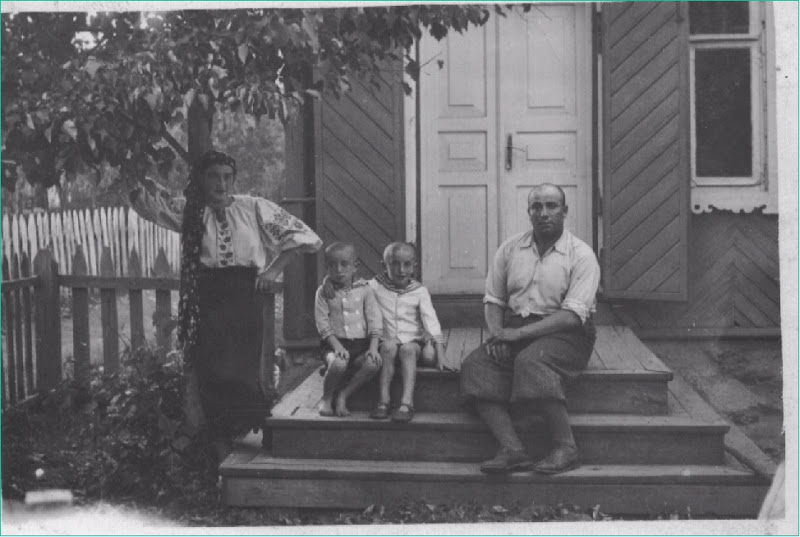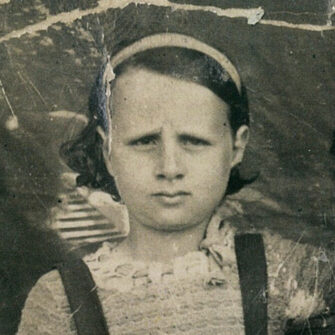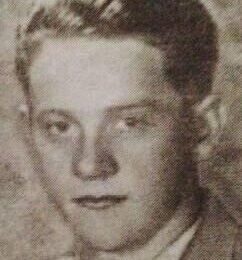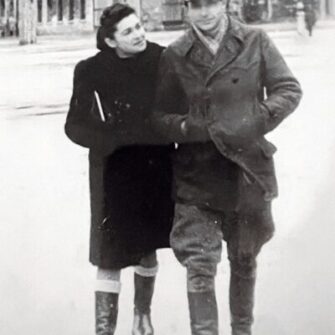Eva (Chava) Kaminska Etkin was born on January 15th, 1913 in Glubokie, Poland (now Belarus) where she lived with her parents, Michaela and Israel Kaminska, and her siblings Lea, Aba, and Zina. In the early 1930s, Eva studied nursing in Vilna and graduated as a certified nurse before finding a job at the Glubokie Hospital. She was a member of Hashomer Hatzair – The Young Guard – where she met Menachem-Mendel Etkin who was born in Dokshitsy, Belarus on August 5th, 1909. Along with his father and brothers, Menachem-Mendel managed multiple family businesses including a sawmill, a flour mill, restaurant, and furniture carpentry.
Eva and Menachem were married on February 19th, 1932 and the couple had twin sons, Chaim-Shepse and Michael. Eva continued working as a nurse and was a devoted mother and wife. Menachem was well-known and respected in the community, often donating money to poor farmers in the region. During the twins’ early childhood in Krulevshchizna, they knew only wealth and happiness in their family. Their life changed drastically with the death of Menachem in March 1941 at the age of thirty-two, just a few months before the Germans arrived in Krulevshchizna. The Germans broke the Molotov-Ribbentrop pact with the Soviet Union and invaded Russia in June 1941. A few months later, in October, the Etkin family was sent to the Glubokie Ghetto along with eighty Jewish families from their small town.
After residing in a comfortable house with many rooms, Eva, her sister, Lea, and the twins were suddenly living together in one small room. No one could enter or leave the ghetto without a permit from the Germans. Whoever was caught outside of the ghetto took the risk of being thrown in prison or killed. Eva embodied her nickname “Briya” which means “Brave” in Yiddish. Without any hesitation, she decided to resist the Nazis. Eva discovered that the partisans in a nearby forest needed nurses and she volunteered her medical experience. Lea cared for the twins as Eva managed to escape the ghetto. Eva joined the October Partisan Brigade where she served as a nurse in the medical unit, caring for the injured in the region of Dokshitsy & Glubokie.
Eva returned to the Glubokie Ghetto to visit the twins and her sister periodically, giving them updates on the war. She warned the twins, “If German soldiers come here asking where I am, tell them that mother is not at home now, that you are also waiting for her, and you don’t know where she is. Don’t tell them anything!” The twins kept silent on their mother’s whereabouts when questioned.
Eva made contact with Jewish forced laborers from the Glubokie Ghetto who were working in German munitions factories. They methodically took weapons from the Germans, and Eva helped smuggle the pistols, grenades, and ammunition to the partisans. If caught, Eva would have been instantly killed.
On August 20th, 1943, the Nazis destroyed the Glubokie Ghetto after a week of armed Jewish resistance. Eva’s son, Michael, escaped to the forest and joined the Rokosovsky Partisan Brigade. Eva heard from a partisan that he saw a red-haired child in one of the partisans’ camps. She assumed it was one of her twins but was not sure which one. On a brown paper bag, Eva wrote in Yiddish: “My dear son, I found out that you are in the forest not so far from me. Be a good boy. Behave well. We will meet each other soon. I love you very much – your mother.”
On June 3rd, 1944 the Nazis caught and tortured the medical unit of the October Partisan Brigade. Eva was among them. The partisans were taken to the center of Dokshitsy and hanged in the city square just a few weeks before the liberation. Eva was thirty-one years old.
Michael survived the Holocaust but lost all his family. He searched for his beloved mother his whole life, but only when he reached the age of sixty-five did he receive answers from the Belorussian embassy in Israel regarding her death. Although Eva’s place of burial is unknown and she has no grave, Michael wanted a memorial built for her and wished to tell his mother that “despite everything – we had won.” In 2009, Michael’s sons, Menachem and Haim Etkin, participated in a Roots Trip to Belarus along with their wives and Menachem’s son. They erected a memorial monument in the Jewish cemetery of Dokshitsy in memory of their grandmother. On the back of the memorial is an aluminum plaque bearing the names of their family members who were killed during the Holocaust.
While in Belarus, they also visited the Globokie Hospital where Eva worked as a nurse until October 1941. They gave the director Eva’s photograph which was put on display in the hospital. “My father always told us that he would like to bring a photo of his beloved mother to the Glubokie Hospital and request that it will be displayed there,” said her grandson, Menachem. “So, we fulfilled one more of my father’s dreams.”
Menachem preserves the legacy of his grandmother and father by giving talks to thousands of students and soldiers throughout Israel. He is dedicated to sharing their memory and has translated his father’s memoir “Despite Everything – I Had Won” for English readers around the world.

